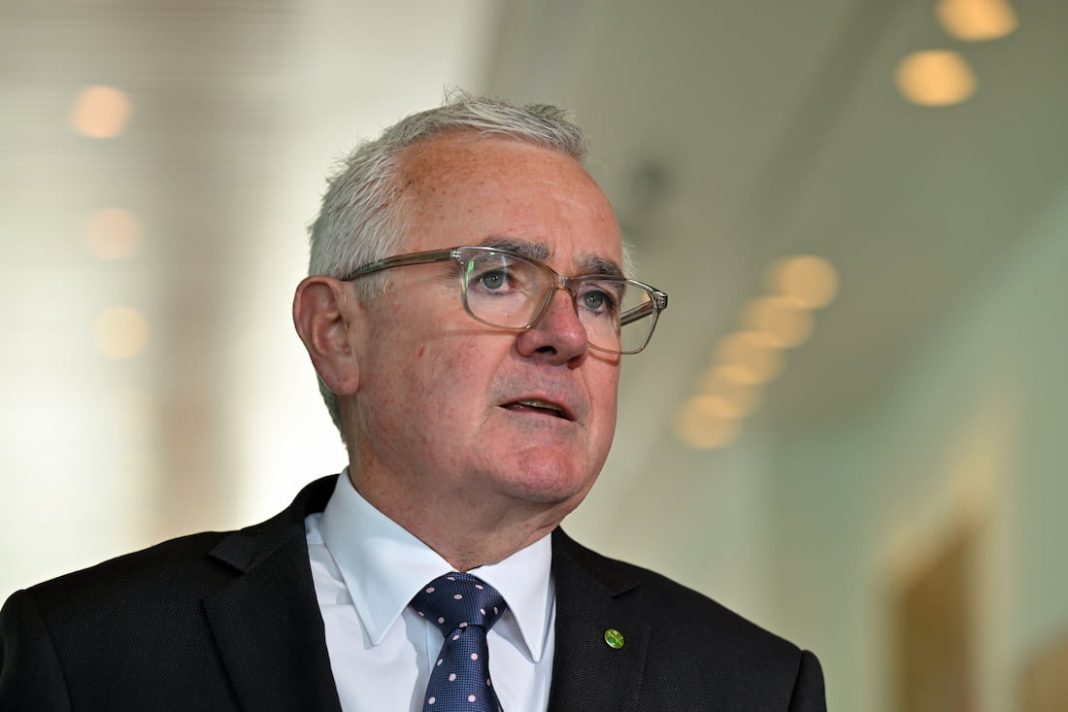AFL chief Andrew Dillon is “unapologetic” about steps taken to ensure players with illicit substances in their system do not take part in matches, following allegations of secret, off-the-books drug-testing enabling some individuals to avoid detection.
Federal MP Andrew Wilkie on Tuesday told parliament of allegations made by former Melbourne club doctor Zeeshan Arain, ex-Demons president Glen Bartlett and Shaun Smith, father of Melbourne player and alleged drug trafficker Joel Smith.
Wilkie said the trio had alleged players who tested positive had faked injury and withdrawn from games to avoid match-day testing by Sports Integrity Australia (SIA), and that “off-the-books” test results were never shared with SIA or the World Anti-Doping Agency (WADA).
Dillon fronted up on Wednesday but dodged questions about players being instructed by their clubs to fake injuries if they tested positive for illicit substances, consistently falling back on the line that it was “private medical information”.
“The private medical information of the players is private medical information and that’s what we prioritise above anything else,” he said.
“What we’re talking about is a doctor and the player who’s their patient and private medical information of that player – which is the private medical information of that player, and it’s that player’s decision to disclose or not.”
Dillon stressed the positive tests related to a “small handful of the 1300 athletes that we have across the AFL and AFLW”, and insisted the league was “a safe place for our players to be”.
Asked if there should be repercussions for misleading the public regarding player injury status, Dillon again referred to private medical information and said detailing the number of players who tested positive for illicit drugs wasn’t in the public interest.
The AFL doesn’t provide that information under its current illicit drugs policy, which is under review.
Dillon was adamant the AFL’s approach to positive tests was a matter of player health and safety.
“We are unapologetic about club and AFL doctors taking the correct steps to ensure that any player who they believe has an illicit substance in their system does not take part in any AFL match and that doctor patient confidentially is upheld and respected,” he said.
“The medical interests and welfare of players is a priority for the AFL given everything we know about the risks facing young people generally and those who play our game in particular.”
Dillon confirmed urine tests have been part of the illicit drugs policy “for some time”.
“Doctors may use those urine tests to obtain an immediate result to determine whether any illicit substance remains in a player’s system,” he said.
“If the test shows a substance is still in the player’s system, a doctor will take steps to prevent a player from taking part in either training and/or an AFL match both for their own health and welfare, and because having illicit substances in your system on match day may be … a breach of the Australian Football Anti-Doping Code.”
Dillon added of the clinical intervention tests: “They will continue to happen because what we’re trying to do is prioritise the health and safety of our players.
“We don’t want our players, if there’s a chance they might have a substance in their system, we don’t want them training and we don’t want them taking part in matches for their health and welfare above anything else.”
The AFL illicit drugs policy was implemented in 2005 and Dillon insisted it had “made a difference to a number of players’ lives”.
He wouldn’t put a time-line on when an “ongoing” review of it would be completed, other than stressing the policy needed to be “fit for purpose for 2024 and 2025 and beyond”.
Dillon noted the addition of AFLW players to the policy was “certainly on the table” under the review.
Wilkie described “deeply troubling allegations of egregious misconduct within the AFL” from Arain, Bartlett and Smith as credible and detailed – and provided signed statements identifying the sources of the documents.
“If there are no illegal drugs in the player’s system they are free to play, and if there are drugs in their system the player is often asked to fake an injury,” Wilkie said.
“They are advised to lie about a condition, while the results of the off-the-book tests are kept secret and are never shared with Sports Integrity Australia or WADA.”
He said Arain alleged it wasn’t a club-specific problem but an “AFL problem”, with a number of players arriving at the Demons with pre-existing cocaine dependencies.
Melbourne coach Simon Goodwin on Wednesday denied knowledge of the alleged secret tests and players faking injuries, and said the Demons would ask for more information from the AFL.



